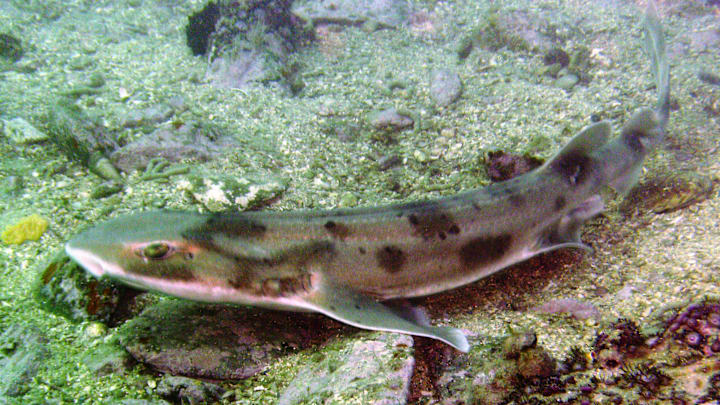Sharks' larger-than-life place in pop culture has fueled many myths, from their reputation as mindless man-eaters to the misconception that they don't get cancer. Another long-held shark belief is now the subject of a new scientific study. As Smithsonian reports, some sharks do sleep, even though they appear to be wide-awake when they're catching up on theirs Zs.
The idea that sharks never sleep comes from the fact that sharks of certain species must be in constant motion to keep oxygen-rich water flowing through their gills. If they stay still for too long, they'll asphyxiate and die.
This isn't true of all sharks, however. Draughtsboard sharks, a bottom-dwelling species native to the waters near New Zealand, are buccal pumping sharks, meaning they use their pharynx to push water through their respiratory system when they're not swimming. For their study published in the journal Biology Letters, researchers from the School of Life Sciences at La Trobe University in Australia and the Institute of Marine Science at the University of Auckland in New Zealand followed these sharks for 24-hour periods. They found that draughtsboard sharks that stayed still for five minutes or longer consumed less oxygen than when they were active. Previous research conducted by the same team found that motionless draughtsboard sharks were slower to respond to stimuli. Both findings are signs of sleep in other species, indicating that draughtsboard sharks may be entering a state of rest when they stop moving.
Draughtsboard sharks may some share sleep habits with other species, but other bedtime behaviors look less familiar. Thirty-eight percent of the sharks in the study kept their eyes open at night even when they showed signs of sleeping. They were more likely to close their eyes while resting during the day, suggesting that external light is an influencing factor on the behavior, the study authors speculate.
The scientists behind the paper claim their research provides "the first physiological evidence of sleep in sharks." But there are still a lot questions to answer about this mysterious aspect of shark life, including how other species rest—if it all. The team plans to analyze the brain activity of draughtsboard sharks during rest as part of the next phase of their research.
[h/t Smithsonian]
